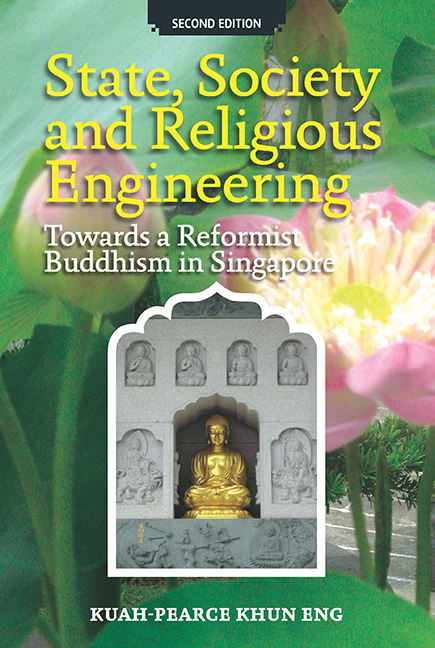Book contents
- Frontmatter
- Contents
- List of Diagrams
- Note on Romanisation
- Preface to the Second Edition
- Acknowledgements to the Second Edition
- Introduction
- PART 1 INVENTING A RELIGIOUS TRADITION
- PART 2 STATE, SOCIETY AND RELIGIOUS ENGINEERING
- 3 Bureaucratising the Temple and the Sangha
- 4 Establishing an Ethno-Religious Framework and the Religious Law
- 5 Buddhist Welfare and Charity
- 6 Experimenting with Religious Values as Asian Values
- PART 3 TOWARDS A REFORMIST BUDDHISM
- Conclusion
- Postscript to the Second Edition: Towards a Humanist and Socially-engaged Buddhism
- Glossary
- Bibliography
- Index
4 - Establishing an Ethno-Religious Framework and the Religious Law
from PART 2 - STATE, SOCIETY AND RELIGIOUS ENGINEERING
Published online by Cambridge University Press: 21 October 2015
- Frontmatter
- Contents
- List of Diagrams
- Note on Romanisation
- Preface to the Second Edition
- Acknowledgements to the Second Edition
- Introduction
- PART 1 INVENTING A RELIGIOUS TRADITION
- PART 2 STATE, SOCIETY AND RELIGIOUS ENGINEERING
- 3 Bureaucratising the Temple and the Sangha
- 4 Establishing an Ethno-Religious Framework and the Religious Law
- 5 Buddhist Welfare and Charity
- 6 Experimenting with Religious Values as Asian Values
- PART 3 TOWARDS A REFORMIST BUDDHISM
- Conclusion
- Postscript to the Second Edition: Towards a Humanist and Socially-engaged Buddhism
- Glossary
- Bibliography
- Index
Summary
INTRODUCTION
As Singapore is firmly established as a multi-religious society, the state has proceeded to protect the link between multi-ethnicity and multi-religiosity. This is done through the establishment of an ethno-religious framework that the state believes is the key to stable ethnic relations. To ensure that this link remains a permanent feature within Singapore society, it has established the “Maintenance of the Religious Harmony Act” which serves to police the functions and activities of the religious institutions, religious personnel and the lay community.
STATE AND ETHNICITY
To understand the significance of the ethno-religious framework in Singapore, it is important for us to understand the background to the relationship between state and ethnicity. The relationship between the Singapore state and the construction of ethnicity is a close one. In post-independent Singapore, the state has consciously created a multiracial framework for its diverse ethnic population, an issue that has been studied by various scholars. Multiracialism is seen as a founding myth of the Singapore state (Benjamin, 1976) on the one hand and as an issue of orientalism by others (Purushotam, 1995). To Benjamin, it is this strict division of ethnic groups as the central tenet of multiracialism that inhibits the growth of a truly Singaporean national culture and identity, resulting in a process of “cultural involution” (Benjamin, 1976:128). Purushotam argues that the management of ethnicity by the Singapore state somehow has not managed to get out of the colonial experience. In fact, the state further reinforces the stereotype grouping of ethnicity by using the existing colonial categories. Thus, she argues, what we see today is a localised form of “orientalism” by the national elite.
In Singapore, ethnicity is taken to be synonymous with race, and it is to the concept of “race” that the political elite subscribe to. Thus, in all official discourses, the state alludes to multi-racialism rather than multi-ethnicity. All citizens are required by law to specify their racial backgrounds. Since independence, the government has consciously maintained this ethnic distribution. This issue has been discussed variously by scholars such as Benjamin (1976), Clammer (1982, 1985) and Purushotam (1995).
There are four main official race categories: Chinese, Malay, Indians and Others. Offspring of inter-ethnic marriages are required to slot themselves into one of these four official categories, which then define them.
- Type
- Chapter
- Information
- State, Society and Religious EngineeringTowards a Reformist Buddhism in Singapore (Second Edition), pp. 132 - 166Publisher: ISEAS–Yusof Ishak InstitutePrint publication year: 2009



